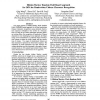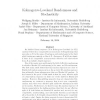68 search results - page 6 / 14 » Autocorrelations of Random Binary Sequences |
CIE
2010
Springer
14 years 1 months ago
2010
Springer
In the theory of algorithmic randomness, one of the central notions is that of computable randomness. An infinite binary sequence X is computably random if no recursive martingale...
DMTCS
2007
13 years 9 months ago
2007
A binary sequence of zeros and ones is called a (d, k)-sequence if it does not contain runs of zeros of length either less than d or greater than k, where d and k are arbitrary, b...
CCA
2009
Springer
14 years 4 months ago
2009
Springer
In the theory of algorithmic randomness, several notions of random sequence are defined via a game-theoretic approach, and the notions that received most attention are perhaps Mar...
ICPR
2000
IEEE
14 years 2 months ago
2000
IEEE
This paper presents a Hidden Markov Mesh Random Field (HMMRF) based approach for off-line handwritten Chinese characters recognition using statistical observation sequences embedd...
STACS
2005
Springer
14 years 3 months ago
2005
Springer
An infinite binary sequence X is Kolmogorov-Loveland (or KL) random if there is no computable non-monotonic betting strategy that succeeds on X in the sense of having an unbounde...


